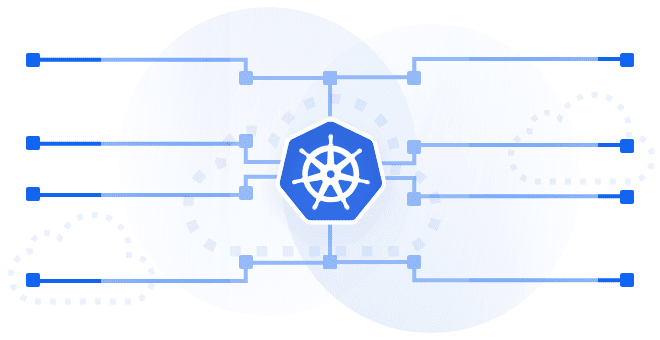Kubernetes: The new standard for deploying containerized application in a cloud environment

What is Kubernetes?
Kubernetes is the new standard for deploying containerized application in a cloud environment. The container orchestration system works well for enterprises deploying at scale – and can be used in private servers, public cloud and hybrid environments.
As the new standard in container orchestration, all of the major cloud platforms (like AWS, Microsoft Azure and IBM Cloud) provide managed services for the platform. But for many enterprises, these services aren’t quite enough as they learn to navigate the complex system designed to automate application deployment at scale.

It’s clearly more than a trend. Originally designed by Google, Kubernetes is open-source and ready to be implemented in any cloud environment. The container orchestration system is now kept up by the Cloud Native Computing Foundation. According to the vendor-neutral site, Kubernetes aims to provide “a platform for automating deployment, scaling and operations of application containers across clusters of hosts.
Kubernetes:K8S
Greek for pilot, the root word for both governor and cybernetic.
At a glance, Kubernetes is:
- An open-source ecosystem for deploying, managing and automating containerized workloads and services.
- Portable to any cloud environment.
- Primarily used with Docker software packages.
- Extensible as a platform for container orchestration, microserves and portable cloud.
“[Kubernetes] made the adoption of emerging software architectural patterns such as microservices, serverless functions, service mesh, event-driven applications much easier and paved the path towards the entire cloud native ecosystem. Most importantly, its cloud agnostic design made containerized applications to run on any platform without any changes to the application code. Today, not only large enterprise deployments can make best out of Kubernetes ecosystem but any small to medium scale enterprises can also save a considerable amount of infrastructure and maintenance costs using it in the long run.”
~ Imesh Gunaratne, Technical Solutions Engineer, Google
Kubernetes as a Platform
Kubernetes operates as a platform to bring flexibility to development teams. At face value, Kubernetes brings a lot of functionality to container orchestration. But, instead of limiting DevOps teams to a fixed set of features, the open-source platform allows extensible uses, including:
- Ad hoc orchestration
- Application-specific workflows
- Customizable automation at scale
Containerized Applications
Software containers (like Docker containers) have updated the way that DevOps teams think about application development, deployment and maintenance. In turn, the Kubernetes container orchestration platform recognizes that containerized applications make application deployment and management easier.
In a phrase, containerized applications package different services of an application into distinct containers – then deploying those containers across a cluster of machines in the cloud or on a physical server. Containerized applications make the entire process more lightweight and faster. Because of that, Docker founder Solomon Hykes called containers the tools of mass innovation.
“Every large enterprise in the world is preparing to migrate their applications and infrastructure to the cloud, en masse. They need a solution to do so reliably and securely, without expensive code or process changes, and without locking themselves to a single operating system or cloud.”
~ Solomon Hykes, Docker Founder
The promise of containerized applications for enterprise is clear. But they require an entirely new application architecture. This is where Kubernetes container orchestration comes in.
Kubernetes vs. Docker
There is often confusion between containerized applications (built largely using Docker) and container orchestration (primarily through the Kubernetes architecture). They both help enterprises run applications, but in distinct ways. In a snapshot:
Use Docker to create and deploy software containers.
Use Kubernetes to manage multiple containers across multiple machines.
Use RTS Labs to bring you up to speed on automating and optimizing container orchestration.
Kubernetes Features
Kubernetes architecture operates on three major elements:
- The container packages software and its dependencies to be portable across environments.
- The pod is the smallest building block in the Kubernetes architecture. Pods enclose an application container (or multiple containers) in order to run as a process on your Kubernetes cluster (i.e. the cloud environment).
- Kubernetes services connect Pods and keep track of how to use them and where to use them within the Kubernetes cluster.
- Kubernetes clusters are made up of a master and node machines, automating where and when objects run.
The foundational concept behind Kubernetes is to bring both simplification and flexibility to container orchestration. The Kubernetes architecture has several elements that help facilitate this:
- Unique Labels for containers let users organize their resources on the platform however they want.
- Annotations for containers and pods help developers coordinate workflows and manage containers according to their own custom information.
- The Kubernetes Control Plane is built on APIs accessible to any developer and user.
- Schedulers coordinate Pods according to a developer’s own rules.
These Kubernetes concepts encapsulate what Kubernetes architecture is all about: container orchestration. They translate into several critical features for Kubernetes as a platform:
- Container grouping
- Self-monitoring
- Auto-scalability
- Horizontal scaling
- Storage orchestration
- DNS management
- Load Management
- Rolling updates
- Container balancing
- Resource monitoring and logging
- Security, networking and storage services
Kubernetes brings container orchestration up to speed.
Kubernetes brings container orchestration up to speed.
Wondering what RTS Labs can do with Kubernetes?
Why you need Kubernetes
Kubernetes is the most efficient platform to run Docker containers as you get applications ready for production. The cloud-native platform provides an efficient environment for deploy, scale and manage and automate applications.

Kubernetes architecture reflects agile concepts, providing the ideal ecosystem for efficient application deployment. The container orchestration tool is powerful in the right hands.
- Optimize your processes. Save your team time and your company money by automating otherwise manual processes with container orchestration.
- Control your container orchestration. Directly control, optimize and automate application deployments and updates.
- Decrease time to deployment and increase scalability. With Kubernetes pods, deployment of containerized application in a cloud environment becomes a much faster process. Horizontal autoscaling and rolling updates mean scalability is simpler.
- See your processes in real time. Kubernetes platform brings a new level of visibility to container orchestration. Easily identify completed and in-process deployments – as well as which deployments are failing and why.
- Reduce needed infrastructural resources. Orchestrate containerized applications across multiple hosts, cutting down on needed server capacity needs. Running software containers cross many different machines directly translates into reduced overhead.
- Scale when you need it. Scaling both up and down is made simple with Kubernetes architecture. Add and remove containers in real time, scaling your resources and applications accordingly.
- Keep containers connected and up and running. Orchestration with Kubernetes deployment means the ability to constantly run containers across a high number of different machines. Kubernetes services will automatically distribute an equal load between containers and launch new containers on different nodes should something fail. The container orchestration platform will also move containers from one host to another with a shortage of resources in a host. Rest assured with the redundancy of multiple instances applications across storage.
- Take testing and maintenance off your hands. Kubernetes microservices will automatically test and correct applications. Health monitoring and host checkups make for smooth sailing.
- Use Kubernetes services. Security, networking and storage services are built-in to the open-source container orchestration platform.
Kubernetes remains immensely popular due to its architecture, innovation, and the large open source community around it. Kubernetes marks a breakthrough for devops because it allows teams to keep pace with the requirements of modern software development. In the absence of Kubernetes, teams have often been forced to script their own software deployment, scaling, and update workflows.
~ Sirish Raghuram, CEO of Platform9 Systems
Kubernetes in action
Containerized application – and therefore container orchestration – is becoming the new gold standard for enterprise DevOps these days. Kubernetes has been used by a host of major players to bring their applications up to speed.
Box. One of the largest content management systems in the world, Box provides cloud solutions for many large enterprises. Over the course of several years, Box deconstructed its infrastructure into microservices using Kubernetes container orchestration.
Capital One. The online bank deploys its applications on AWS, all of which handle millions of transactions daily. Using Kubernetes as an ‘operating system’ in their product development and deployment keeps things spontaneous along the way.
Wikimedia Foundation. Wikimedia’s collaborative projects – like Wikipedia – requires a dynamic hosting environment for both developers and users. Using Kubernetes simplifies the environment and makes wikis run more efficiently.
Other case studies for Kubernetes in action include Squarespace, SlingTV, and The New York Times.
What to know about Kubernetes before getting started
Kubernetes basics are relatively straightforward – but putting them into practice for your enterprise application is a different question altogether.
With customizable Kubernetes consulting, we can provide:
- Initial consultations as you get started with Kubernetes architecture
- Strategy to increase efficiency and automation for your existing containerized applications
- Ready-built applications with Kubernetes
- Plan of action as you transition to automation in Kubernetes
Replatforming to a pure cloud based environment (or even a hybrid) can present some major challenges for the enterprise. Kubernetes consulting team may be your solution.
RTS Labs brings the expert knowledge of container orchestration that you need.
Looking to get started with Kubernetes? Contact us